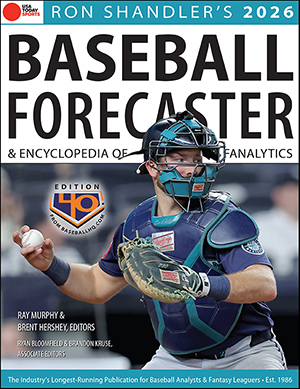
(*) MASTER NOTES: Using Spring Stats
Last week on the Tuesday Tout edition of our BaseballHQ Radio podcast, Joe Sheehan commented on the best way to look at the stats players generate during spring training.
In his typically straight style, Joe said, “Not at all.”
Joe’s take is that spring training stats are generated by players who aren’t always trying their best to win games, and are often doing it against other players also not trying THEIR best to win games. Not that the players are losing on purpose—it’s just that they are working on techniques, trying to add or improve particular skills, and in general not always doing the things they will be doing when the regular season starts.
Joe is right about that.
I looked through the spring training stats through games of Wednesday, March 12, and what I saw made me pretty suspicious of the whole enterprise as a projection base.
Let’s look at the hitters. By the end of spring training, the leaders in plate appearances will be somewhere near 100 (Domonic Brown led spring training last year with 97 PA).
The leaders in plate appearances for a typical MLB season are over 700, so the spring training leader has the equivalent of about three weeks of stats. Which as we all know by now is nowhere near enough to draw inferences about player performance. Especially when, as Joe Sheehan said, many of those plate appearances will be against third-stringers, pitchers trying new pitches, and guys on the way out trying desperately to hang on.
And if 100 plate appearances is a shaky foundation for analysis, 40 has to be even worse. But 40 PA is what Jurickson Profar, this year’s spring training leader, had through March 12.
So you can’t sensibly draw inferences. But you CAN play up those spring training stats when you’re talking with the other owners in your leagues.
For instance, imagine you own Mike Moustakas, and you are wisely looking to trade him on his long-awaited but as yet unrealized potential. You phone or e-mail a trading partner, and you point out that among all hitters who have more than 25 plate appearances this spring, Moustakas is leading in OBP at .571, Slg with .913, OPS at 1.449, and HR with three (Russell Martin has four, but in just 18 PA).
The breakout is happening!
You might also mention, by way of “proving” the validity of the spring stats, that Miguel Cabrera is second in OPS.
But if he asks, “Who’s third?”, emulate Abbott and Costello and say “I Don’t Know,” because the third-place OPS guy through Wednesday was Dustin Ackley, sporting a 1.328 OPS that is almost double his career level.
In all, 15 spring hitters had an OPS above 1.000 as of Wednesday. Not one of them has a career OPS above 1.000, although Cabrera is close at .967. One player, Joc Pederson of the Dodgers, has never even played a big-league game. For the rest, the difference between their spring OPS and their career OPS ranges from about 300 points to about 800 points (Moustakas, if you’re keeping score at home).
I also looked at the top 25 OPS guys from last spring, and compared their results in the regular season:
- 13 of the top 25 spring training OPS leaders didn’t even play in the major leagues during the regular season.
- Only one, Yasiel Puig, was in the top 25.
- And only two others, Brandon Belt and Ryan Raburn, were in the top 100.
And turning it around, I looked at the top 25 regular season OPS leaders (250+ AB) in 2013, and at their spring OPS results:
- Two (Puig and Raburn) had been in the top 25 in spring.
- Four others (Mike Trout, Paul Goldschmidt, Joey Votto and Joe Mauer) were in the top 100.
- And the rest ranged from 130th to 692nd. Cabrera was 192nd, Robinson Canó was 448th, and Edwin Encarnación 648th in spring, to name a few.
And it works much the same the other way around—six of the bottom 25 OPS guys in the regular season were in the top 100 for the spring, led by noted slugger Chris Getz, who stroked a nifty 1.092 in spring and followed up with a less-nifty .561 during the season. When the games started counting, Getz stopped.
There’s a better connection in Stolen Bases. Among players who had 250 regular season PAs last year, Ben Revere led spring training in swipes, and the top guys included such SB standouts as Emilio Bonifácio, Desmond Jennings, Craig Gentry, Mike Trout, Starling Marte and Jean Segura.
But for overall hitting? Not happening. Using spring training batting stats to forecast regular season batting stats is a mug’s game. In spring training, the samples are small, the competition is suspect, and the motivations and goals are different than they will be in the regular season.
The danger in spring numbers is confirmation bias. We look at these essentially meaningless numbers to “prove” our pre-existing opinions about player potential. A fantasy owner who believes Mike Moustakas is going to break out will use his hot spring to confirm that opinion. An owner who thinks Moustakas is never going to get there writes off the spring as a fluke.
So enjoy the games, and use the stats for sensible purposes, like watching to see who’s winning position contests and how managers are setting up their rotations, bullpens, and batting orders as spring edges towards Opening Day.
And enjoy the flukiness of spring training stats.
In looking at this spring’s stats, I happened to notice that Seattle has a guy who has a double and a walk in a couple of plate appearances. That means he has a 1.000 OBP, a 2.000 Slg and a 3.000 OPS. He won’t make the club, but if you liked Smokey and the Bandit, you have to be rooting for a Mariners' farmhand named Burt Reynolds.





-300x200.png)


